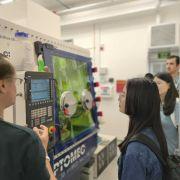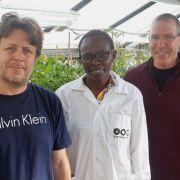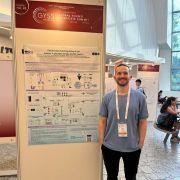Summer of Research Discovery at Tel Aviv University
International students engage in diverse projects through TAU’s summer research program
How did the Israeli-Palestinian conflict turn existential? What diseases did people suffer from 9,000 years ago? How can locusts help detect odors? Why do insurance companies refuse to cover double mastectomies for women who decide to go flat? These are just some of the questions that international students will be exploring during their summer research internships at Tel Aviv University (TAU).
Over the course of two months, students from all around the world will be working under the supervision of TAU faculty members in university labs and research teams, enjoying full access to TAU campus services, extensive libraries, and online resources. They will also be taking advantage of everything that Tel Aviv has to offer in the summer!
The summer research program at TAU is divided into two distinct tracks, one in social sciences and humanities, and another in sciences which include everything from psychology to engineering, life sciences, and exact sciences. When applying, students choose the project that best aligns with their academic interests and are accepted into the program upon approval from the lead researcher.
This year, over 60 students have already begun their work, aiming to present their results at the end of July. Initially, students sit down with the lead researcher in their chosen lab to define the project scope and goals. The work typically involves not only literature review and analysis, but also conducting experiments to test their hypotheses, and validating results. This approach ensures participants gain hands-on practical experience.
From Insurance Policies to the Gig Economy, and Fiction Books
Speaking to participants during the kick-off meeting for the Summer Research Program in Humanities and Social Sciences, Prof. Milette Shamir, the head of the program and the VP for International at TAU, emphasized that the university values the opportunity to host international students on campus.
“In a crisis, turmoil, and change, the value of social sciences research begins to surface even more than usual as access to credible information becomes exceptionally valuable, along with critical reading and thinking.” — Prof. Milette Shamir
Projects in this track are extremely diverse: one examines the rise of the populist radical right parties and the news slant across different news outlets, while another assesses the effects of interventions by the International Monetary Fund. There are also projects investigating legal obstacles to breast cancer treatment, the nature of the Israeli-Palestinian conflict, and the emergence of leadership structures among ride-hailing drivers in India.
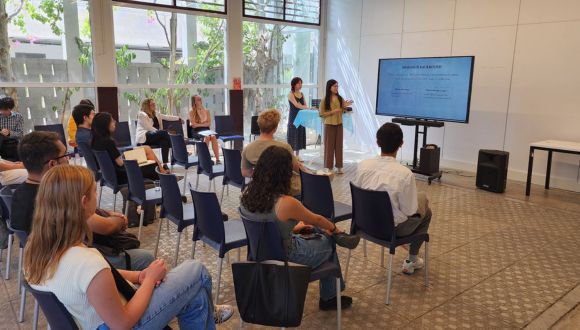
Introductory Session for Summer Research Program in Humanities and Social Sciences
For Wu Sijia from the Joint Institute for Jewish Studies at Shandong University, this program is an opportunity to take her PhD studies to the next level. She focuses on religious studies and is particularly interested in the interrelationship between the secular and religious worlds in Israel.
“Coming to Israel is important for my research.”
During her research internship, Sijia will be reading twelve fiction books and memoirs for her project on the images of Jews and their relation with non-Jews in Eastern Europe.
Diving into Lab Work
Prof. Ben Maoz, who is heading the Summer Research Program in Sciences, reassured the students that at TAU, they will receive all the support necessary to experience research (and Tel Aviv) in the best way possible.
‘It will give you a really good sense of research because you will be in the labs.” — Prof. Ben Maoz
In the sciences program, the projects span genetic engineering, astrophysics, neuroscience, physics, biomedicine, and other fields.
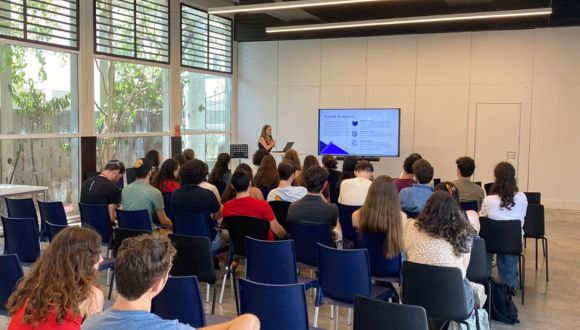
Introductory Session for Summer Research Program in Sciences
Have you ever wondered how toothbrushes factor into anthropological research? Students interning at the Biohistory and Evolutionary Medicine Laboratory will be using them in their work with skeletal remains from two excavation sites in Israel to clean the bones. Their project involves preserving and reconstructing the skeletons, and retrieving biological data about the general health and demographic profile of the individuals.
Another student's research will involve manipulating the electric signals to which locust antennae respond, aiming to establish how different odors can be differentiated.
Projects also include growing an adult organoid heart system, researching how a person’s gaze conveys attention, simulating asymmetry in early-universe cosmological sources, improving AI defense against attacks, investigating various types of tumors, studying gene mutations, and much more.
We wish all the students success in their research and an enjoyable summer in Tel Aviv!


